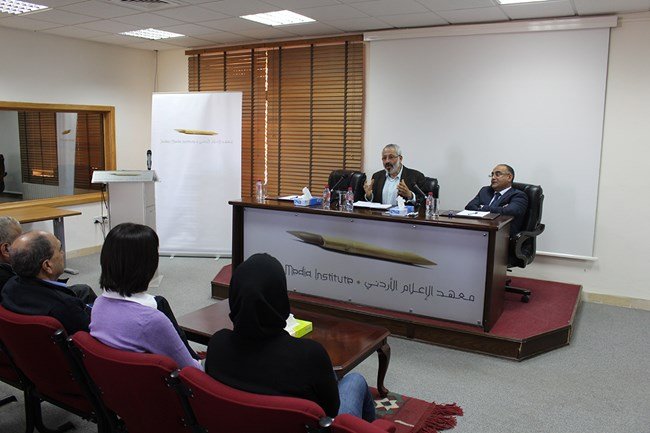Image:

19 Apr 2017
Amman -- Dr. Mustafa Hamarneh, president of the Economic and Social Council, said that the first condition that a media person has to meet is professionalism, which is not less important than advanced legislation. If the media is not professionalized, we will stay where we are and we will lag behind and not keep up with contemporary civilization. <br />
<br />
In a lecture he delivered at the Jordan Media Institute (JMI), moderated by JMI Dean Dr. Basim Tweissi, on media and economic and social options in Jordan, Dr. Hamarneh, who had previously occupied the position of chairman of the board of directors of the Jordan Radio and Television Corporation, pointed out that professionalism has two aspects: Knowledge and moral responsibility. He affirmed that journalists and media persons could not make progress without expanding their knowledge base, which is the philosophical root that provides the compass for writing. Likewise, the media cannot advance without moral responsibility. <br />
<br />
He called on media colleges and faculties to adopt the professional aspect and equip students with the requirements of media work, theoretical weapons, and the necessary tools and to direct them to search for the truth. He said that every theoretical framework has its tools and is linked to the style of writing, which shows the status of the press writer and his inclinations. <br />
<br />
He maintained that there is no neutrality in the media. Rather, there is an objective approach that prevents a professional media person from accusing the other of lying or using non-objective terms until he establishes the truth. He added that many reports presented by youth in the various media lack a message or objective and indicate that the decision-maker lacks the simplest tools of knowledge and the method and approach of search and investigation.<br />
<br />
On the situation of the media, the founder of the Center for Strategic Studies at the University of Jordan said: The current media scene is based on exclusion and fierce hostility toward the other, whoever he might be. It is also based on settling scores and personal vendettas, which are not related to the subject being discussed or the historical stage we are experiencing. <br />
<br />
He added: What we see on some social media sites, in terms of the huge flow of misleading information, confuses public opinion and deepens fears that turn into vendettas. He referred to people in Jordan who have been victimized because of the pressure of the media, which is far removed from the truth. <br />
<br />
He said that some websites compete over who has more information without heeding the truth of what they offer to the public. Sometimes, they deliberately seek to mislead people, and the falsity of this information is revealed. Regrettably, this scene gets repeated everyday on a number of websites. They do not learn the value of presenting information that is characterized by professionalism and credibility. Instead, they repeat the same experience. Even readers derive this false information from these sites and go back to them time and again.<br />
<br />
The founder of Al-Sijil newspaper said that 50% of our knowledge of Western society came through our reading of Western newspapers. We studied the dynamics and movement of society, political parties and their positions, social assemblies in different regions, and other daily issues, which we learned about from the press. He wondered: Can any person draw conclusions about the dynamics of Jordanian society through what he reads in the local media? Absolutely not. This is a flaw. <br />
<br />
He called on workers in the media to conduct an in-depth and professional study of societal issues and subjects and present them to the public, regardless of the results, because media persons have a responsibility to speak the truth. He urged intellectuals and media persons to expand their knowledge base and change the type of dialogue in our country. <br />
<br />
At the end of the lecture, which is part of the "guest lecturers program," in which the JMI hosts a number of opinion leaders, decision-makers, and prominent journalists to sum up their views of a number of topics, Dr. Hamarneh answered questions by the attendees.<br />
<br />
It is worth noting that the JMI has started receiving applications for the MA program in Journalism and New Media for the year 2017/2018 until 6 July. <br />
<br />
For more information, please visit the website of the JMI www.jmi.edu.jo or call the following numbers + 962 6 5713304/6.<br />



